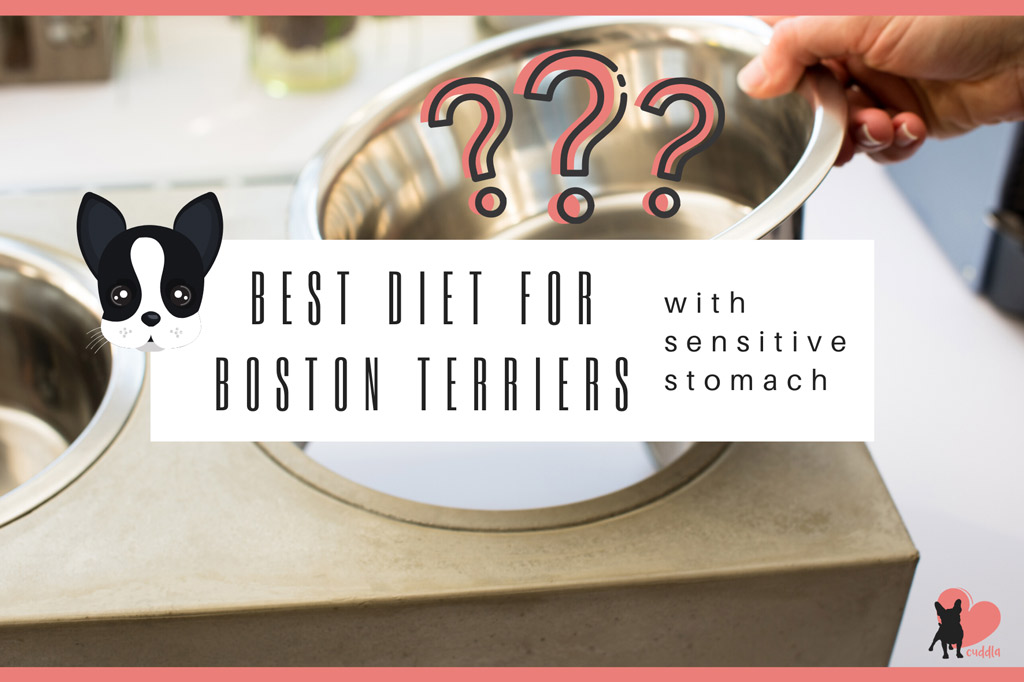
Your dog’s diet and lifestyle will influence their livelihood. And I’ve always wondered…
Do Boston Terriers have sensitive stomachs? Also, what foods are Boston Terriers allergic to?
In my last post, Boston Terrier Allergies, I went through the types of allergies, causes, symptoms, diagnosis and treatments available. Here, I will focus on their food intolerance and allergies.
So, let’s see what you can feed your pooch to improve this situation and prevent his discomfort.
Diet for Boston Terriers with Sensitive Stomach or Allergies
Boston Terriers can have sensitive stomachs and some develop food intolerance and even food allergies. Plus, certain foods and ingredients can cause your dog to be itchy and gassy too.
Before I go any further into the subject, here’s a disclaimer:

I am not a veterinarian, so always check with your vet before changing your Boston Terrier’s diet to avoid unexpected consequences.
However, I do have knowledge on dog nutrition and first-hand experience with gassy dogs, a common symptom of food intolerance.
Your Boston Terrier can suddenly develop a food allergy to something that he has eaten for years with no problems.
Your Boston has to be sensitised, i.e., he has to have been exposed to it for some period of time. He won’t react dramatically out of the blue, but he will start showing allergic symptoms.
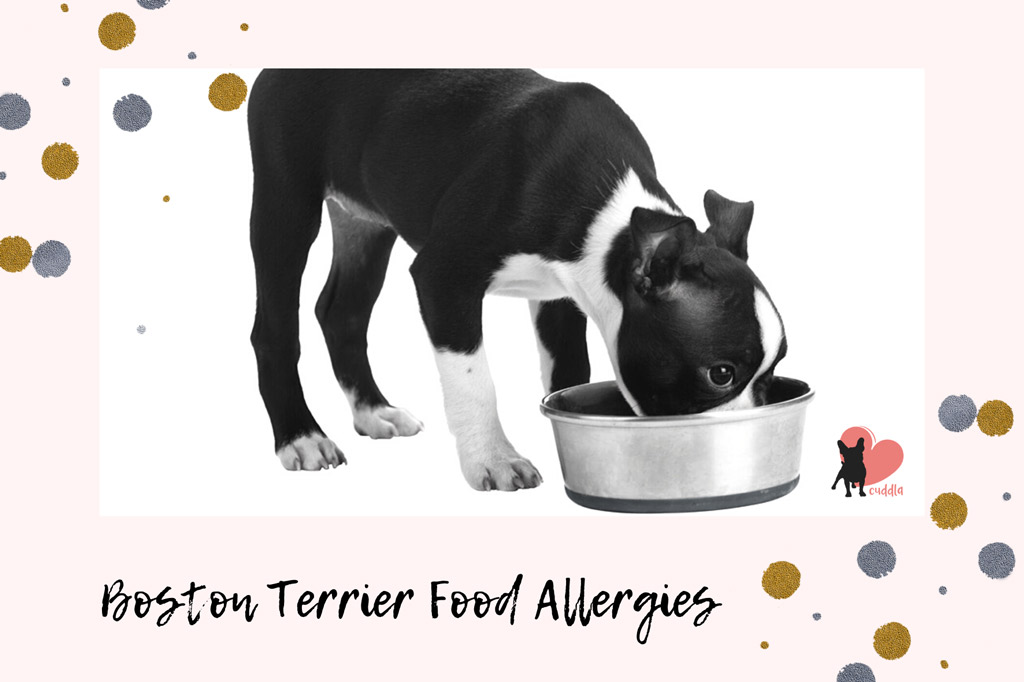
Food Allergens
Although food allergies are difficult to identify without testing, there are certain ingredients and foods that have been proven to cause allergies in dogs (source):
- Grains (gluten), including corn, wheat, oats and barley.
- Rice (gluten).
- Soy.
- Dairy.
- Food additives.
- Colouring agents.
- Animal protein (beef, egg, chicken, lamb, pork, rabbit, and fish).
- Etc.
All the ingredients above are found in processed pet food like kibble.
There are studies that prove how these foods aggravate allergies. (I will discuss food options further down).
If your Boston Terrier consumes a lot of processed foods including various kinds of proteins, fillers, colouring agents, etc. the incidences of food allergies are more than one can imagine.
Although there are many recorded incidences of allergies to corn and wheat, food allergies can vary from dog to dog.
For Boston Terriers, a food allergy or intolerance can cause your dog to be gassy. The top causes of flatulence in Boston terriers are corn and soy, grains that are frequently found in commercial dry dog foods.
Read also: Boston Terrier Allergies – Causes, Symptoms and Treatments and Are Boston Terriers Gassy? How to Stop Excessive Flatulence.
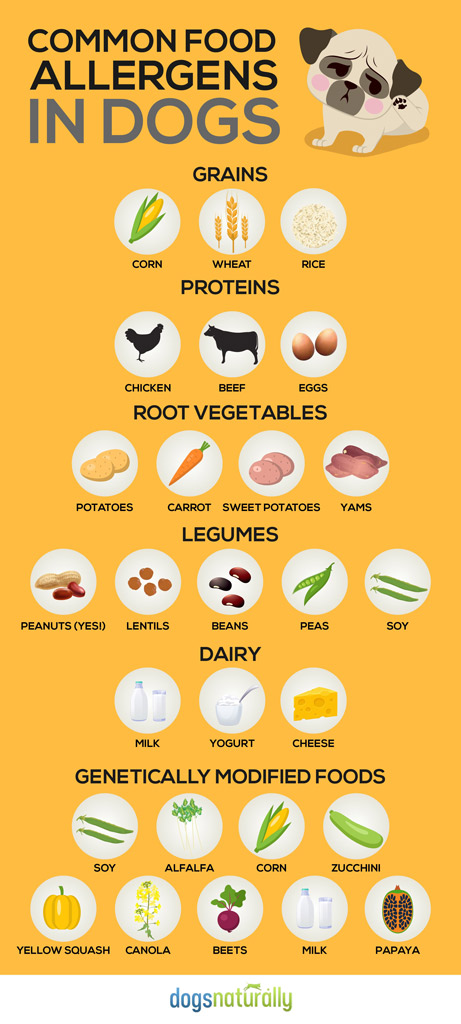
Ingredients to Avoid
After seeing the list of food allergens, you would want to stay away from certain ingredients like:
- Corn.
- Grains (wheat).
- Soy.
- Artificial colours.
- Additives and preservatives.
- Sugar.
- Potatoes.
- Rice.
- Unidentified meat or “meals”.
As well as avoiding dangerous ingredients, such as:
- Propylene glycol.
- 1,2-dihydroxy propane.
- 1,2-propanediol.
- Methyl glycol.
- Trimethyl glycol.
- BHA (can cause cancer).
- BHT (can cause liver, thyroid and kidney problems).
- Ethoxyquin (liver, kidney, thyroid and reproductive dysfunction).
And the list goes on!
Basically, anything you don’t identify as food or cannot pronounce should make you pause and reconsider.
In any case, these ingredients are not essential (they don’t add value) to your Boston Terrier’s nutritional needs. Plus, they have been proven to cause them irritation, inflammation, itchiness, leaky gut (dysbiosis) and more serious health problems.
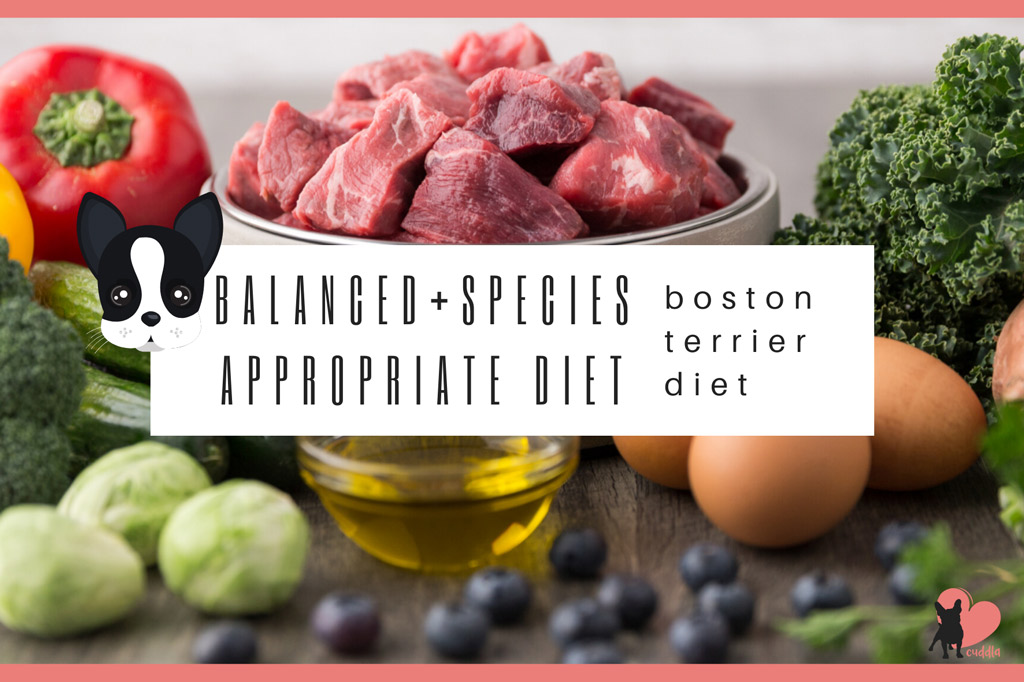
Changing Your Boston Terrier’s Diet
Once you know that your Boston Terrier has a food allergy and your vet has identified the allergens, it’s time to change your Boston Terrier’s diet.
The goal is to treat your Boston Terrier’s gastrointestinal tract and gut by improving his diet.
There are two steps to this treatment:
- Avoid foods that contain the allergen (for processed food) or remove the ingredient from your dog’s meals (for homemade meals).
- Decide what type of diet best suits your Boston Terrier. You should always consult with your vet or dog nutritionist to make sure that your dog is getting all the nutrients he needs.
Personally, I recommend following a balanced and species-appropriate diet to boost your dog’s immune system, reduce inflammation and maintain overall health.
A balanced and species-appropriate diet should include:
- High-quality protein.
- Low animal fat.
- A balanced ratio of Omega-3 and Omega-6 fatty acids.
- High moisture content.
- A low amount of vegetation (mimics prey’s stomach contents).
Which also means:
- No fillers like grains, corn, potatoes or other starches that don’t belong to the primordial diet.
- No artificial colouring or preservatives.
- No harmful chemicals.
Read also: Boston Terrier Diet – The Ultimate Guide to Dog Nutrition, where I analyze the pros and cons of every dog diet.
Best Diet for Boston Terriers with Sensitive Stomach and Gassiness
Here are the best foods for Boston Terriers with a sensitive stomach or those with allergies, from more desirable (#1) to least desirable (#6):
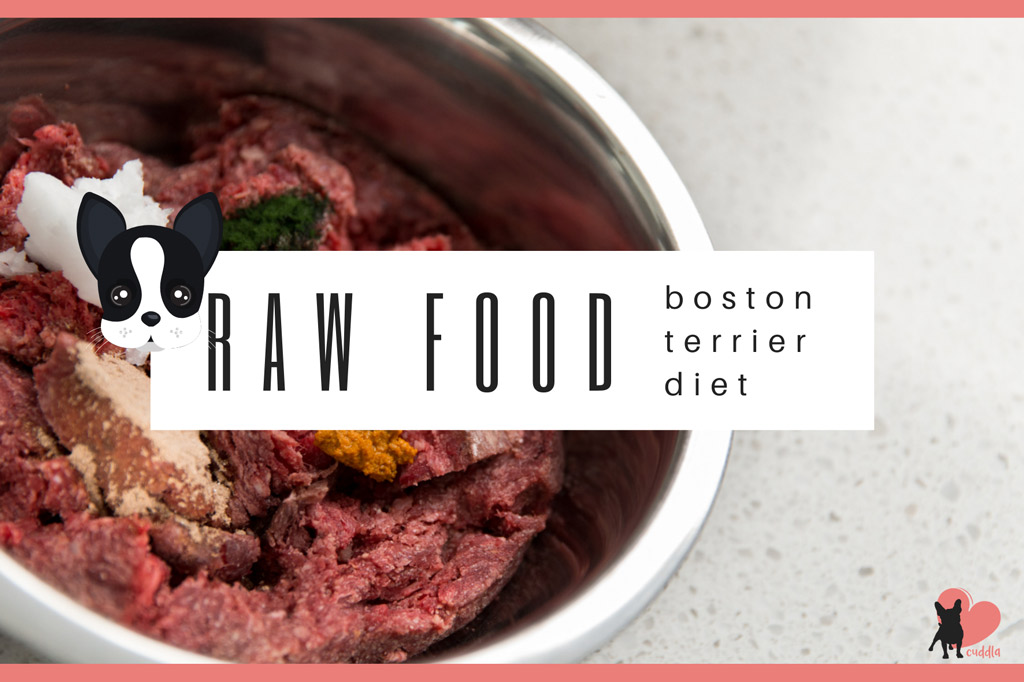
#1 – Homemade Raw Diet
Fresh raw food is the primordial diet for dogs and probably the safest bet.
When you choose a food that’s freshly prepared in small batches, with a few human-grade ingredients and no artificial fillers, you can see exactly what your pup is getting.
Fresh food diets that are nutritious and that include higher amounts of antioxidants and well-preserved fats can reduce your Boston Terrier’s allergies, and in some cases, eliminate them.
A raw diet is the best food for:
- Boston Terriers with sensitive stomachs.
- Boston Terriers with food allergies.
- Gassy Boston Terriers.
This type of diet stays away from unnecessary carbohydrates (corn, wheat, rice, and soy) but includes beneficial vegetables and fruits.
You can also decide on which sources of protein and fat you want to add to your dog’s meal.
Also, you can easily stay away from artificial fillers, preservatives and flavouring with this diet.
Read also: Boston Terriers Raw Diet – The Ultimate Guide to Raw Feeding.
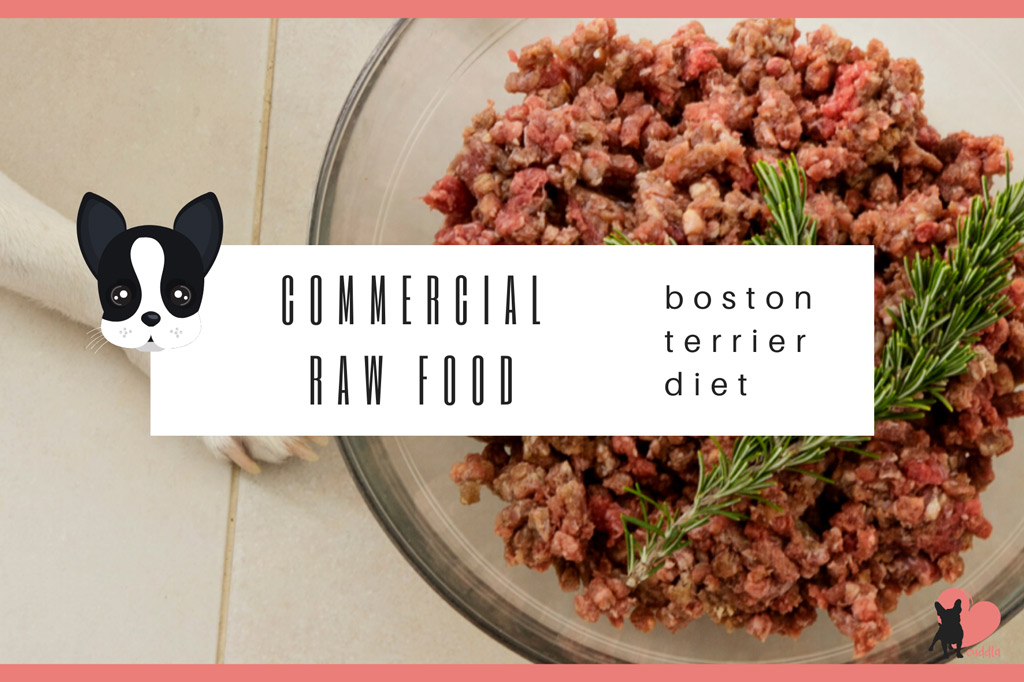
#2 – Commercial Raw Diet
If you’d rather not spend time preparing your Boston Terrier’s food, or you just don’t have the time… then you can consider:
- Purchasing already prepared raw food.
- A made-from-scratch, small-batch dog food delivery service that emphasizes quality and purity.
Commercial raw food for dogs can be a closer looking alternative to the raw diet for your Boston Terrier.
On their “Guaranteed Analysis” you can see the four critical food components (protein, fat, fibre and moisture) percentages. The food should be analyzed on a Caloric Basis since it holds moisture, and it’s a suitable metric for a high-calorie nutrient-dense food like raw diets.
Also, they follow AAFCO‘s requirements. But they don’t apply to raw food since their tests were done on kibble fed dogs.
Best Commercial Raw Diet for Boston Terriers
Here’s a range of commercial raw food, which is freeze-dried. Brands like Stella & Chewy’s uses grass-fed animals, wild-caught fish and organic veggies and fruits.
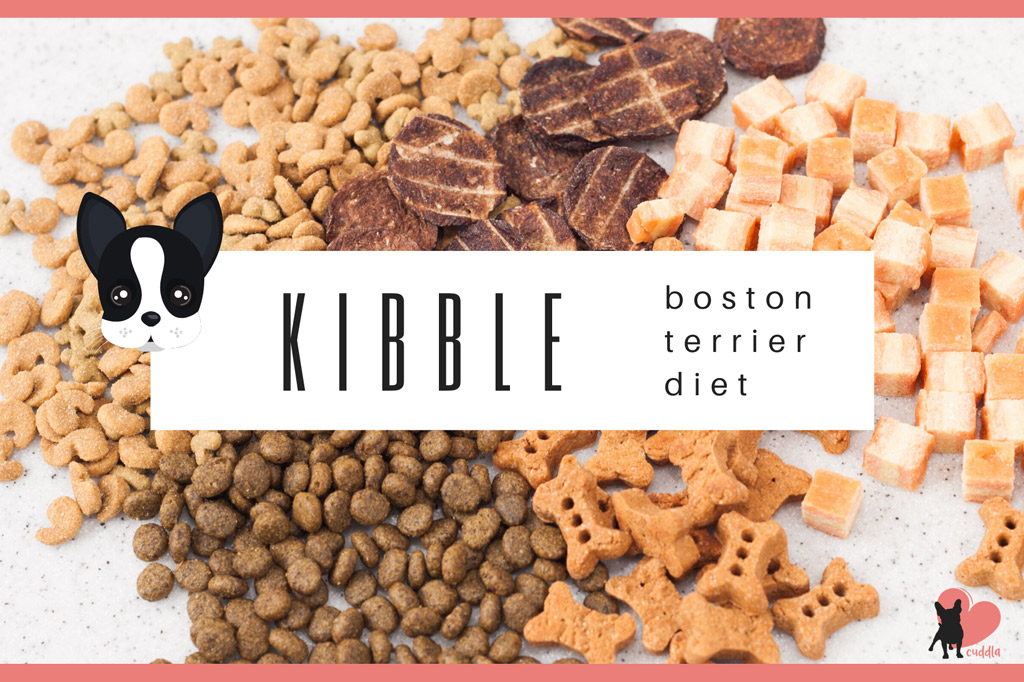
#3 – Dry Diet
Processed pet food like kibble is both responsible for flatulence, sensitivity and food allergies now, and further health problems later on.
So, it’s not a healthy option. Plus, it’s far away from what dogs have evolved to eat.
Dog are carnivores and evolved to consume a low-carbohydrate diet. But for the last century, the majority of dog owners have fed their dogs a high-carbohydrate, low-moisture diet, i.e. kibble.
Also, they are cooked using completely different techniques than fresh foods that change nutrient levels, alter the absorption of the food, or introduce contaminants of other possible allergens.
However, if you decide to feed kibble to your Boston Terrier…
Choose a recipe free from artificial additives and made with natural ingredients such as premium animal proteins, healthy fats, and grain-free carbohydrates.
Best Kibble for Boston Terriers with Sensitive Stomach or Allergies
If your Boston Terrier is intolerant or allergic to gluten (grains and rice) or a specific type of grain (corn), you can feed him a kibble diet corn-free, for instance.
Just look for foods labelled “gluten-free” or “grain-free.” Here’s a dog wholesome (whole prey) grain-free food selection.
Best Kibble for Gassy Boston Terriers
Stay away from these ingredients:
- Soy.
- Corn.
- Grains.
Ideally, also you want to limit these:
- Legumes: lentils, chickpeas and beans.
- Potatoes.
- Rice.
Instead, you want to look for a fruit and vegetable carbohydrate source. But, when looking at kibble options, it can be difficult to avoid starches like potatoes and rice or legumes and beans.
However, I did find these options:
- Purina Beyond Natural Adult Dry Dog Food Superfoods Blend, which includes salmon (first ingredient), eggs and pumpkin. But includes rice and barley (although the brand says no wheat). Also oats, but they don’t have gluten.
- Earthborn Holistic Venture Grain-Free Dry Dog Food Rabbit and Pumpkin (95% protein, but it contains peas).
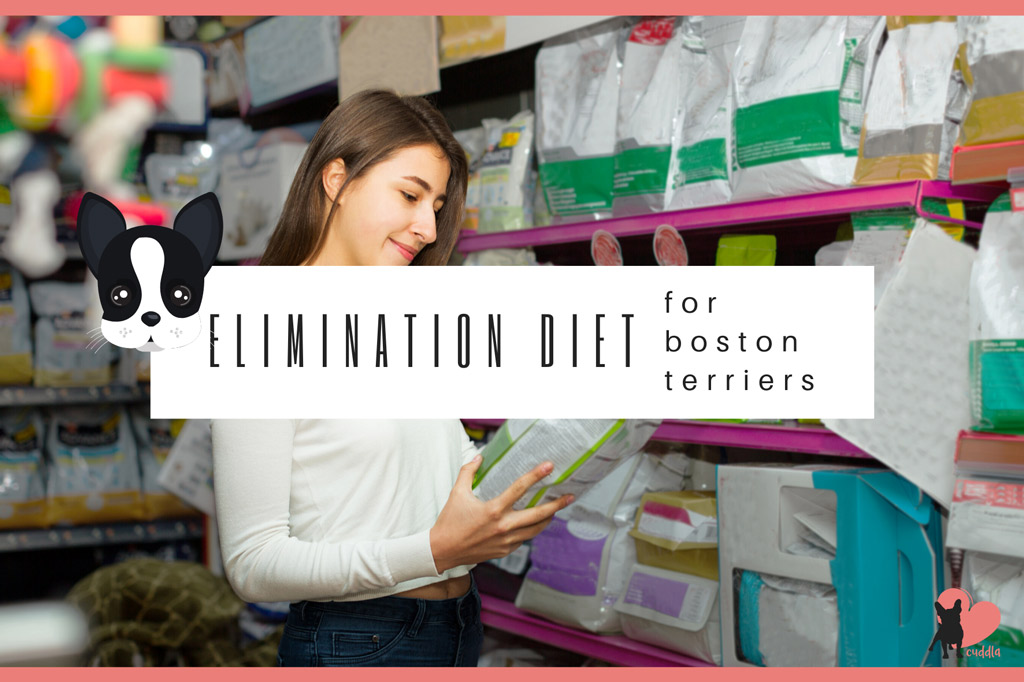
#4 – Elimination Diet
Warning: The following diets are best for elimination diet testing since they won’t provide enough nutrition to your Boston Terrier.
To begin treating food allergy symptoms in your Boston Terrier, your vet might recommend an elimination diet (a food trial). You will feed a simple ingredient case-specific diet for a minimum of eight weeks.
This dog food diet will have single sources of animal protein and carbohydrate different from what causes an allergic reaction to your Boston Terrier.
Usually, these ingredients will be something that your Boston hasn’t been exposed to.
During the food trial, you should avoid feeding your Boston Terrier any treats, table scraps, supplements, or flavored medications (if possible).
After eight weeks, you will slowly begin to reintroduce specific ingredients. If your pooch reacts to an ingredient, it should be permanently eliminated from your dog’s diet.
For Boston Terriers with severe food allergies, custom elimination diets with limited ingredients can be the answer. Always check with your veterinarian first though.
#4.1 – Limited Ingredient Diet
A limited ingredient diet usually contains one source of animal protein and one source of carbohydrate.
However, this diet on its own won’t provide all the essential nutrients that your Boston Terrier needs. A limited ingredient diet is best used for elimination diet testing, not as a regular diet.
When looking for the best limited ingredient diet, you should look for:
- Limited ingredients (1 protein source).
- Grain-free.
- No artificial colours, flavours, or preservatives.
Here are some whole food (whole prey) with limited ingredients:
- Natural Balance Limited Ingredient Dry Dog Food, grain-free:
- Blue Buffalo Limited Ingredient Diet, grain-free:
#4.2 – Hypoallergenic Diet
A hypoallergenic diet is usually used for elimination diet testing.
They typically contain a source of protein that your dog has not previously been exposed to such as venison, rabbit, fish or duck.
These diets don’t contain corn, wheat or any ingredients derived from them. But they contain one equally unfamiliar carbohydrate, such as potato or quinoa.
These are some hypoallergenic dog foods:
- Natural Balance Limited Ingredient Dry Dog Food, grain-free: Bison and Sweet Potatoes or Venison and Sweet Potatoes.
- Blue Buffalo Limited Ingredient Diet, grain-free: Lamb and Potatoes or Salmon and Potatoes.
#4.3 – Novel Diet
Similar to the hypoallergenic diets, novel diets offer an unfamiliar source of protein that goes from buffalo to kangaroo meat.
Remember that beef and chicken are usually the most common sources of protein in processed dog foods.
Here’s a selection of novel foods.
- Venison and Red Lentils by Purevita Grain-Free Venison Dog Food.
- Duck and Green Lentils by Purevita Grain-Free Duck Dog Food.
- Rabbit and Pumpkin by Earthborn Holistic Venture Grain-Free Dry Dog Food.
- Wild Boar and Butternut Squash by Earthborn Holistic Venture Grain-Free. Dry Dog Food

I read the article and you specifically said to avoid rice, barley, oat. Did you look at the ingredients in Purina Beyond Natural Adult Dry Dog Food – Superfoods Blend Formula & Small Breed Formula? It has all of the ingredients you said to avoid.
Why would you recommend that food when it has all of the allergens you said to avoid?
Hi Alexandra,
Thank you for pointing that out and I apologise if it has caused confusion. I added a disclaimer about the barley and rice.
Kibble is not my first recommendation, but among the options that I have researched, Purina’s Beyond Natural Adult Dry Dog Food has less of the ingredients to avoid.
Also, it’s meant to be wheat-free according to its label. However, as you pointed out, it does contain rice and barley (not sure how that makes it wheat-free). Oats, on the other hand, do not come from wheat. Plus, they have no gluten, which makes them more digestible for dogs.
Thanks for your comment and I hope my reply brings some clarity. Let me know if there’s something else I can help you with.